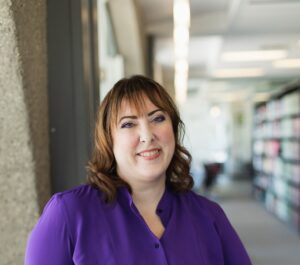*Note: This session has passed. Please view the recording and resources below.
About the Session
Join Dr. Kari D. Weaver (University of Waterloo) as she introduces the newly launched Artificial Intelligence Disclosure (AID) Framework. As artificial intelligence (AI) tools—particularly generative AI based on large language models—become widely available, their use across education and research must be negotiated. The AID Framework tool provides a transparent, consistent, and targeted approach to attribute the use of AI in teaching and research work. The AID Framework can also serve as a solid foundation for discussing the ethical and productive use of AI across different contexts. This workshop will introduce the elements of the AID Framework, provide examples of AID statements used for both education and research purposes, and address some common questions and adaptations made to the AID Framework worldwide.
Speaker
Dr. Kari D. Weaver (she/her) is the learning, teaching, and instructional design librarian at the University of Waterloo Libraries and a sessional faculty member in the department of leadership, higher, and adult education at the Ontario Institute of Studies in Education (OISE) at the University of Toronto. She holds her M.L.I.S. from the University of Rhode Island and her Ed.D. from the University of South Carolina and has been a practicing academic librarian for 18 years at institutions in the United States and Canada.
 Dr. Weaver’s extensive research background centers on the intersection of human information behavior and pedagogy. She publishes on a wide range of topics including information literacy, academic integrity, generative artificial intelligence, misinformation, scientific communication, educational research methods, online learning, and digital accessibility. Professionally, she is an executive member of the Trust in Research Undertaken in Science and Technology Scholarly Network (TRuST), an invited member of the American Library Association’s prestigious Intellectual Freedom Committee, and a member of the Canadian Association of Professional Academic Librarians’ (CAPAL) Research and Scholarship Committee. Her current work, including the development of the AID Framework, is conducted on the traditional territory of the Attawandaron (Neutral), Anishinaabeg, and Haudenosaunee peoples, location of the main campus of the University of Waterloo.
Dr. Weaver’s extensive research background centers on the intersection of human information behavior and pedagogy. She publishes on a wide range of topics including information literacy, academic integrity, generative artificial intelligence, misinformation, scientific communication, educational research methods, online learning, and digital accessibility. Professionally, she is an executive member of the Trust in Research Undertaken in Science and Technology Scholarly Network (TRuST), an invited member of the American Library Association’s prestigious Intellectual Freedom Committee, and a member of the Canadian Association of Professional Academic Librarians’ (CAPAL) Research and Scholarship Committee. Her current work, including the development of the AID Framework, is conducted on the traditional territory of the Attawandaron (Neutral), Anishinaabeg, and Haudenosaunee peoples, location of the main campus of the University of Waterloo.
Recording and Resources
- Transcript: Research Speaker Series: Transparent, Detailed, Ethical – An Introduction to the Artificial Intelligence Disclosure (AID) Framework (PDF)
- Transcript: Research Speaker Series: Transparent, Detailed, Ethical – An Introduction to the Artificial Intelligence Disclosure (AID) Framework (Word)
- Slides: Research Speaker Series: Transparent, Detailed, Ethical – An Introduction to the Artificial Intelligence Disclosure (AID) Framework (PDF)
- View recording on media.bccampus.ca
About the Series
The BCcampus Winter 2025 Research Speaker Series offers participants and presenters an opportunity to learn and share knowledge and advocacy on research methods, approaches, and pedagogies around accessibility, access, Indigenous engagement, and equity, diversity, and inclusion (EDI) in teaching and learning.
These livestream webinars take place every month from January to March and will allow you to learn about new research directly from the researchers.
Sessions
- January 21, 2025 – Storytelling sm̓iʔmay̓ Futurisms from the Digital Frontier. Challenging Colonial Narratives through a Digital Embodied Story Practice and Research-Creation, Mariel Belanger, Queen’s University
- February 25, 2025 – Transparent, Detailed, Ethical: An Introduction to the Artificial Intelligence Disclosure (AID) Framework, Kari D. Weaver, University of Waterloo Libraries
- March 11, 2025 – Engaging in Great Practices for Research on Teaching and Learning, Brett McCollum, Thompson Rivers University
Learning Outcomes
By the end of this series, participants will be able to:
- Broaden your knowledge and research skills in the B.C. post-secondary context.
- Learn about Indigenization, EDI, decolonization, and accessibility in research.
- Be inspired to participate in research communities of practice or explore the themes in your work.
- Connect with academics and community members who share your interests.
